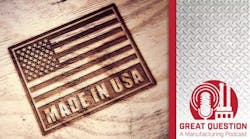The good news is that, as you're well aware, many manufacturers are making tremendous technological strides. Today’s advanced facilities are nothing like the dark and dirty factory floors of yesteryear. Progressive facilities are bright, clean and streamlined, with cutting-edge processes and technologies such as 3D printing, robotics, mobile internet, cloud computing, etc. These are selling points manufacturers should be using to gain an edge in an increasingly competitive marketplace.
So how can these progressive, well-equipped manufacturers convince potential employees that manufacturing is an attractive option? How can they find and recruit the skilled workers to fill the gap? I’ve got a few ideas…
Right messaging, right time
All about the benefits
Next, young candidates need to be shown what modern manufacturing is like and the advantages it offers. Manufacturers should bring photos and videos to these presentations to demonstrate that their environments are clean, climate-controlled, streamlined and automated front-to-back. They should help potential hires envision working in a position in which they’ll use cutting-edge technology.
Manufacturers should point out the advantages of not just the job, but also the wider benefits. Oftentimes the compensation, healthcare and retirement benefits rival those of many entry-level white collar jobs. They can point out that manufacturing work today is quite stable, with regular daily/weekly scheduling that makes for good work/life balance.
Emphasis on training
With the right individuals recruited and secured, wise manufacturers focus on retention of skilled employees through robust training programs. Initial and ongoing training tells an employee that the company values them and is willing to invest in their future—that’s of high importance to today’s young people.
The manufacturing skills gap can be closed by today’s employers. With a few key ideas in mind, the right candidates can be secured, trained and retained, which helps the company—and the employee—stay at the forefront of today’s manufacturing renaissance.
Chris Bakos is director of recruiting at Advanced Technology Services.



